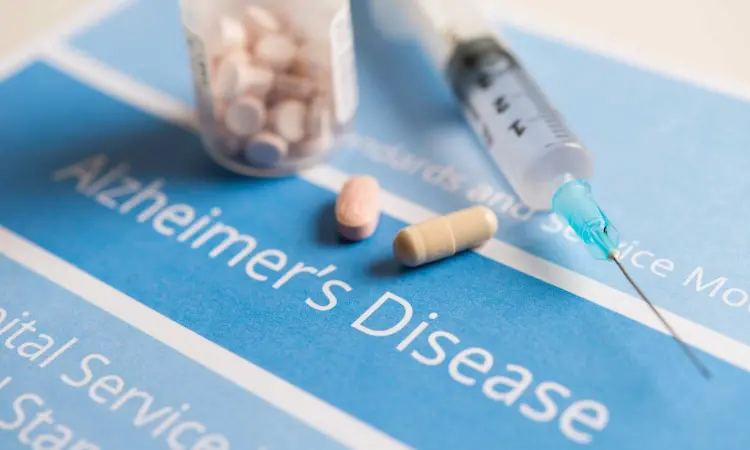- Home
- Medical news & Guidelines
- Anesthesiology
- Cardiology and CTVS
- Critical Care
- Dentistry
- Dermatology
- Diabetes and Endocrinology
- ENT
- Gastroenterology
- Medicine
- Nephrology
- Neurology
- Obstretics-Gynaecology
- Oncology
- Ophthalmology
- Orthopaedics
- Pediatrics-Neonatology
- Psychiatry
- Pulmonology
- Radiology
- Surgery
- Urology
- Laboratory Medicine
- Diet
- Nursing
- Paramedical
- Physiotherapy
- Health news
- Fact Check
- Bone Health Fact Check
- Brain Health Fact Check
- Cancer Related Fact Check
- Child Care Fact Check
- Dental and oral health fact check
- Diabetes and metabolic health fact check
- Diet and Nutrition Fact Check
- Eye and ENT Care Fact Check
- Fitness fact check
- Gut health fact check
- Heart health fact check
- Kidney health fact check
- Medical education fact check
- Men's health fact check
- Respiratory fact check
- Skin and hair care fact check
- Vaccine and Immunization fact check
- Women's health fact check
- AYUSH
- State News
- Andaman and Nicobar Islands
- Andhra Pradesh
- Arunachal Pradesh
- Assam
- Bihar
- Chandigarh
- Chattisgarh
- Dadra and Nagar Haveli
- Daman and Diu
- Delhi
- Goa
- Gujarat
- Haryana
- Himachal Pradesh
- Jammu & Kashmir
- Jharkhand
- Karnataka
- Kerala
- Ladakh
- Lakshadweep
- Madhya Pradesh
- Maharashtra
- Manipur
- Meghalaya
- Mizoram
- Nagaland
- Odisha
- Puducherry
- Punjab
- Rajasthan
- Sikkim
- Tamil Nadu
- Telangana
- Tripura
- Uttar Pradesh
- Uttrakhand
- West Bengal
- Medical Education
- Industry
Hot flashes yet another early indicator for Alzheimer's disease

As if hot flashes alone weren't bad enough for women going through the menopause transition, a new study suggests that, especially when they occur during sleep, hot flashes may be early indicators of a woman’s increased risk for Alzheimer’s disease (AD). And, the more hot flashes, the greater the disease risk. Study results will be presented during the 2023 Annual Meeting of The Menopause Society in Philadelphia September 27-30.
Women comprise two-thirds of individuals with AD, and there are a number of theories as to why this is true, with many focused on decreased estrogen levels that occur during the menopause transition. Prior research has linked one of the most common symptoms of menopause-hot flashes-with poor memory performance and with alterations in brain structure, function, and connectivity. However, it is unknown whether hot flashes are associated with AD biomarkers.
Recent advances in assessing AD include the development of AD blood-based biomarkers, which have proven especially useful for assessing risk decades before the emergence of AD dementia. These biomarkers were used as part of a new study involving nearly 250 midlife women. The objective of the study was to determine whether objectively assessed hot flashes are associated with adverse AD biomarker profiles.
Dr. Rebecca Thurston, Director of Women’s Biobehavioral Health at the University of Pittsburgh Department of Psychiatry, and Dr. Pauline Maki, Professor of Psychiatry at the University of Illinois at Chicago, led the study. Based on the results of the study, Drs. Thurston, Maki, and their team concluded that hot flashes experienced during sleep may be a marker of women at risk of AD dementia. Further, a greater number of sleep hot flashes were associated with an increased likelihood of AD. These findings remained significant after additional adjustments for estradiol and actigraphy-assessed sleep characteristics. Hot flashes were measured objectively by using ambulatory skin conductance monitoring.
“Among other things, these findings indicate that women who experience frequent hot flashes, particularly during sleep, may warrant AD dementia risk reduction efforts,” says Dr. Thurston.
“Given the adverse effect on quality of life and financial burden of AD, it’s important that we learn as much as possible about potential causes and warning signs so we can be proactive before the onset of AD,” adds Dr. Stephanie Faubion, medical director of The Menopause Society. “This study underscores the need for ongoing open dialogues between patients and their healthcare professionals so that any treatment options can be carefully considered.”
Study results will be presented at this year’s Annual Meeting of The Menopause Society as part of the presentation entitled “Menopausal Vasomotor Symptoms and Plasma Alzheimer’s Disease Biomarkers.”
Reference:
Hot flashes yet another early indicator for Alzheimer's disease, The Menopause Society, Meeting: 2023 Annual Meeting of The Menopause Society.
Dr Kamal Kant Kohli-MBBS, DTCD- a chest specialist with more than 30 years of practice and a flair for writing clinical articles, Dr Kamal Kant Kohli joined Medical Dialogues as a Chief Editor of Medical News. Besides writing articles, as an editor, he proofreads and verifies all the medical content published on Medical Dialogues including those coming from journals, studies,medical conferences,guidelines etc. Email: drkohli@medicaldialogues.in. Contact no. 011-43720751


